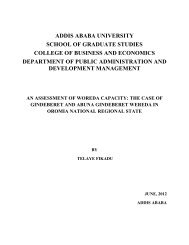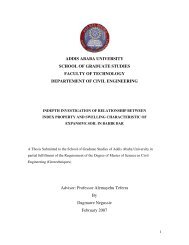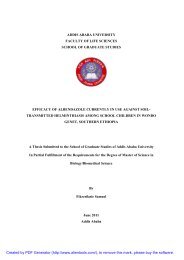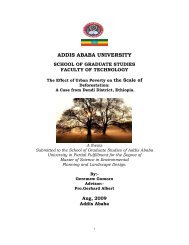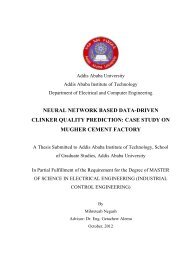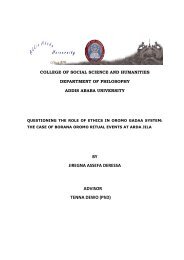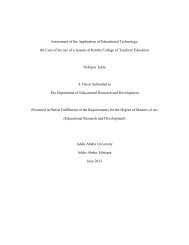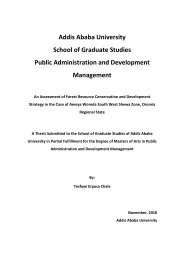FACTORS THAT CONTRIBUTE TO THE PROBLEMS EFL ...
FACTORS THAT CONTRIBUTE TO THE PROBLEMS EFL ...
FACTORS THAT CONTRIBUTE TO THE PROBLEMS EFL ...
Create successful ePaper yourself
Turn your PDF publications into a flip-book with our unique Google optimized e-Paper software.
Item No.<br />
Table-2d: Learners’ responses that refer to listening problems due to the<br />
discrepancy between written and spoken language.<br />
Students’ No.<br />
Never<br />
Students’ %<br />
Students’ No.<br />
Table-2d shows that the great majority of the students, i.e., 76% of the students<br />
have responded that they often or always found it difficult to identify the words they<br />
knew in their written form when they hear them in a stream of speech.<br />
From this result, we can conclude that there are words that most students normally<br />
recognize in their written form, but which the learners find difficult whenever they<br />
hear them in a stream of speech. In the Ethiopian case, when a student learns a<br />
new word or expression, it is believed the student usually learns both its written<br />
and spoken form. His recognition of the new word is linked to his knowledge of<br />
what it looks like on paper and what it sounds like when carefully pronounced by<br />
the teacher. If the student is not aware of what the new word sounds like when it is<br />
said quickly and juxtaposed with other words, the student may not realize that this<br />
may affect its pronunciation. This is also consistent with Ur’s statement (1984)<br />
which shows that difficulty in listening comprehension is partly due to listeners’<br />
confusion that appears when they encounter juxtaposition of two words in which<br />
one of the sounds at the junction point has disappeared or is assimilated with the<br />
other. In this case, therefore, the learners fail to recognize the combined word.<br />
Table-2e: Learners’ responses that refer to listening problems related to the ability<br />
of managing tasks.<br />
Facing frustration due to failure to perform tasks, and listening tasks that demand<br />
the skills of writing at the expense of listening are the main points which will be<br />
presented as follows. To make the analysis easier, item number 12 and 13 are<br />
presented together to the fact that both factors are directly related to the managing<br />
of listening tasks.<br />
Seldom Total<br />
positive<br />
Students’ %<br />
Students’ No.<br />
Students’ %<br />
LEVEL OF DIFFICULTY<br />
Sometimes Often Always Total<br />
negative<br />
Students’ No.<br />
Students’ %<br />
10 2 1.34 9 6.04 11 7.38 25 16.77 48 32.88 65 43.62 138 92.61<br />
45<br />
Students’ No.<br />
Students’ %<br />
Students’ No.<br />
Students’ %<br />
Students’ No.<br />
Students’ %




